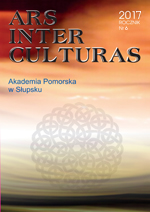AWANGARDA, TOTALITARYZM, GLOBALIZACJA: WSPÓLNE DOŚWIADCZENIE? WYBRANE ZAGADNIENIA SZTUKI XX WIEKU NA UKRAINIE I W POLSCE
AVANT GARDE, TOTALITARIANISM, GLOBALISATION: COMMON EXPERIENCE? SELECTED ISSUES OF XX CENTURY ART IN UKRAINE AND POLAND
Author(s): Elżbieta KalSubject(s): Language and Literature Studies, Fine Arts / Performing Arts, Cultural history, Social Philosophy, Social history
Published by: Wydawnictwo Naukowe Akademii Pomorskiej w Słupsku
Keywords: Ukrainian art; painting of 20th century; avant garde; social realism; globalisation; artistic inspirations; cultural recycling
Summary/Abstract: The text constitutes a reference to the article on applying social realism discourse in pop-art and modern popular culture (“Ars inter Culturas” 5 (2016): 209-239) and an elab- oration by means of including Ukrainian art. It reminds about Ukrainian artists’ contribu- tion to the development of the avant garde of the first half of 20th century and social realism ideas of involvement, “growing of art into” life as well as its presence in various areas of social practice. It also recalls the mediatory role of Władysław Strzemiński be- tween Russian and Polish avant garde.Furthermore, on the basis of examples the author analyses formal strategies adopted from avant garde by the output of social realism, points to iconographic patterns of Ukrain- ian works from which Polish artists got inspiration according to their programme and critics’ recommendations. Also, differences resulting from the relations between pattern- mutation are important, as well as the duration of the doctrine which was in force from the first half of the 30s to the end of the 80s of the 20th century in Russia while in Poland in the years of 1949/50-1954/55. In both countries, it had important but different conse- quences, which results in different attitudes to realism as a general artistic strategy. Con- temporary communication and globalisation processes have led to standardisation of vis- ual language also in post-soviet countries, and internet memes play a significant role in it. In the world of the Internet, the elements of social realism discourse become memes de- tached from old meanings, lose their historical and political sense, become an element of entertaining exoticism which enhances forgetting about an oppressive character of the doctrine which, especially in Ukraine, has led not only to the exclusion but also to the extermination of artists.
Journal: Ars Inter Culturas
- Issue Year: 2018
- Issue No: 7
- Page Range: 145-188
- Page Count: 43
- Language: Polish

